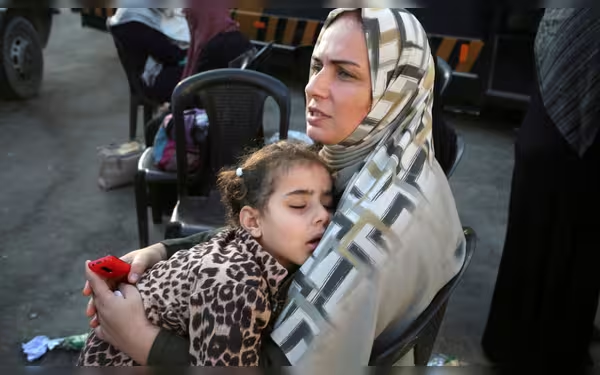Thursday, November 7, 2024 02:36 PM
Israel, WHO Evacuate Gazans for Urgent Medical Care
- Over 200 Gazans evacuated for medical treatment.
- Evacuation facilitated through Kerem Shalom crossing.
- 14,000 individuals await medical evacuation from Gaza.
 Image Credits: arabnewspk
Image Credits: arabnewspkIsrael and WHO evacuate over 200 Gazans for urgent medical care amid ongoing conflict.
In a significant development, Israel and the World Health Organization (WHO) announced the evacuation of over 200 individuals from Gaza for medical treatment. This operation, which took place on Wednesday, involved both patients and their caregivers, totaling approximately 230 people. The evacuees were transported to either the United Arab Emirates or Romania, marking a crucial step in addressing the dire medical needs of those affected by the ongoing conflict.
The evacuation was facilitated through the Kerem Shalom crossing, a key transit point between Israel and Gaza. According to COGAT, the Israeli defense ministry body responsible for civil affairs in the Palestinian territories, this operation represents the largest number of patients and caregivers to leave Gaza in recent months. The WHO confirmed that the patients included individuals suffering from various serious health conditions, such as autoimmune diseases, blood disorders, cancer, kidney issues, and trauma injuries.
Rik Peeperkorn, the WHO’s representative in the Palestinian territories, highlighted the urgency of the situation, noting that those evacuated were part of a larger group of up to 14,000 individuals currently awaiting medical evacuation from Gaza. This underscores the critical humanitarian crisis unfolding in the region, exacerbated by the ongoing conflict.
The backdrop to this evacuation is the tragic escalation of violence that began with Hamas’s attack on Israel on October 7, 2023, which resulted in the deaths of 1,206 people, primarily civilians. In response, Israel launched a retaliatory campaign that has reportedly claimed the lives of 43,391 individuals in Gaza, with a significant majority being civilians, according to figures from the Gaza health ministry. The ministry also reported that over 102,000 people have been injured since the onset of the conflict.
Despite the ongoing violence, the recent evacuation operation demonstrates a collaborative effort involving the UAE, the European Union, and the WHO, aimed at providing much-needed medical assistance to those in desperate need. However, Peeperkorn pointed out that since the war began, fewer than 5,000 people have been granted medical evacuations, highlighting the challenges faced in addressing the health crisis in Gaza.
As the situation continues to evolve, it is essential to recognize the humanitarian implications of the conflict. The evacuation of these patients is a small but significant step towards alleviating the suffering of many. It serves as a reminder of the urgent need for continued international support and intervention to address the health and humanitarian crises in Gaza, ensuring that those in need receive the care and assistance they deserve.













